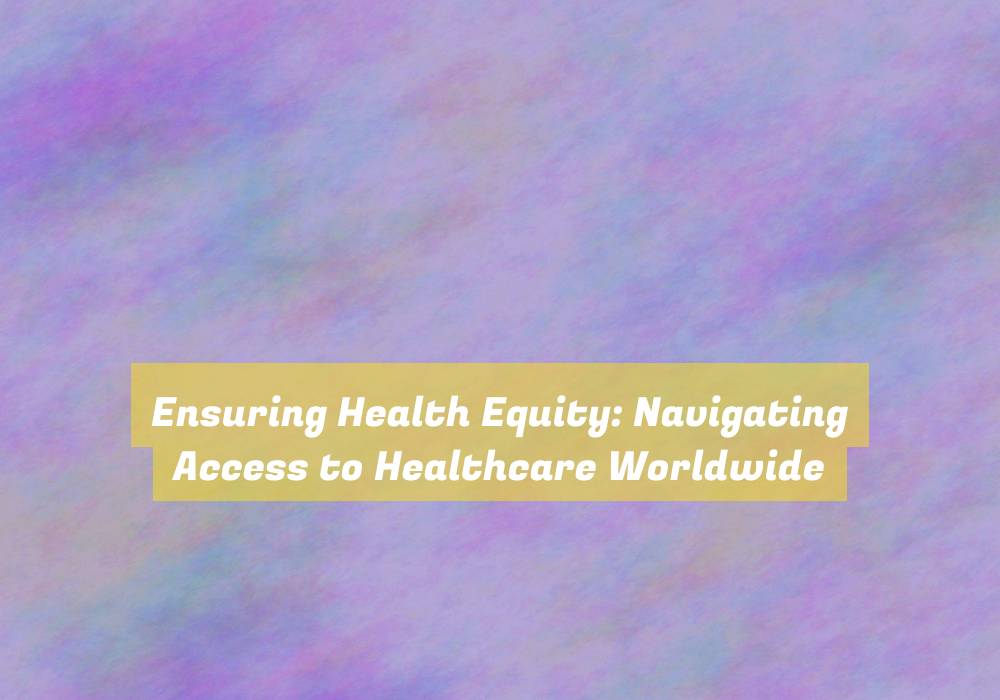Ensuring Health Equity: Navigating Access to Healthcare Worldwide
Ensuring health equity is a complex and pressing issue. This is evidenced by the vast disparities in healthcare access and outcomes worldwide. From the stark contrast between the healthcare available in urban and rural areas to the discrepancies in healthcare access among different socioeconomic groups, the need for addressing these disparities is undeniable.
As you consider the far-reaching impact of healthcare access on individuals and communities, you may be surprised to learn about the intricate web of factors contributing to these inequities and the innovative strategies being developed to tackle them.
By exploring the multifaceted nature of healthcare disparities and the efforts to bridge these gaps, youG??ll gain valuable insights into the global pursuit of health equity.
Understanding Healthcare Disparities
Understanding healthcare disparities is crucial for addressing inequalities in access to medical services worldwide. When you consider healthcare disparities, youG??re looking at the differences in access to healthcare services and health outcomes experienced by different groups. These differences can be based on factors such as race, ethnicity, socioeconomic status, geographic location, gender, age, or disability.
By understanding these disparities, you can identify the root causes and work towards creating targeted interventions to bridge the gaps. For example, in many regions, marginalized communities face barriers to accessing quality healthcare, leading to poorer health outcomes compared to more privileged groups.
Recognizing and addressing these disparities is essential for achieving health equity and ensuring that everyone, regardless of their background or circumstances, has the opportunity to lead a healthy life. By acknowledging and actively working to understand healthcare disparities, you can play a vital role in advocating for policies and practices that promote equal access to healthcare for all.
Addressing Social Determinants of Health
To address social determinants of health, consider the impact of socioeconomic factors on access to medical care and health outcomes. Your socioeconomic status significantly influences your ability to access healthcare services. Lower income levels often correlate with limited access to quality medical care, leading to higher rates of untreated illnesses and poorer health outcomes.
Additionally, factors such as education, employment, and housing can affect your overall health. For instance, individuals with lower levels of education may be less informed about preventive healthcare measures and have less access to job benefits that include health insurance. Unstable housing conditions can also contribute to increased stress and exposure to environmental hazards, negatively impacting health.
To address these social determinants, policymakers and healthcare providers must work to improve access to education, affordable housing, and employment opportunities. By addressing these underlying social factors, we can work towards reducing health disparities and ensuring that everyone has the opportunity to achieve their best possible health.
Navigating Global Healthcare Policy
The impact of socioeconomic factors on access to medical care and health outcomes underscores the need to understand global healthcare policy and its implications for addressing health disparities worldwide.
As an individual, you play a crucial role in navigating the complexities of global healthcare policy. Understanding the policies that govern healthcare systems across different countries is essential to advocate for equitable access to healthcare on a global scale. By staying informed and engaged, you can contribute to shaping policies that prioritize health equity and address disparities in healthcare access and outcomes.
Global healthcare policy encompasses a wide range of issues, including funding mechanisms, regulatory frameworks, and international collaborations. ItG??s important to stay informed about these policies and their potential impact on healthcare delivery and health outcomes.
Additionally, being aware of international efforts to promote health equity and access to essential healthcare services can empower you to support and contribute to these initiatives. By advocating for policies that prioritize health equity and address social determinants of health on a global level, you can help ensure that everyone, regardless of their socioeconomic status or geographical location, has the opportunity to lead a healthy life.
Strategies for Improving Healthcare Access
Improving healthcare access requires innovative approaches and collaborative efforts to address barriers and expand equitable care for all individuals. One strategy involves leveraging technology to bridge gaps in access. Telemedicine, for example, enables individuals in remote or underserved areas to connect with healthcare providers, improving access to medical expertise. Additionally, mobile health clinics can bring essential services directly to communities in need, overcoming geographical barriers and reaching marginalized populations.
Another crucial strategy is to invest in preventive care and public health initiatives. By focusing on education, vaccination programs, and disease prevention, healthcare systems can reduce the burden on acute care services and promote overall wellness, ultimately improving access for all. Furthermore, policies that support healthcare workforce development and training can enhance access by ensuring there are enough skilled professionals to meet the needs of diverse populations.
Collaboration between governments, healthcare organizations, and community stakeholders is also vital. By working together to identify and address specific barriers to access, such as affordability, cultural competence, and language barriers, we can create more inclusive and effective healthcare systems. These strategies, coupled with a commitment to equity and social justice, can pave the way for improved healthcare access worldwide.
Conclusion
In conclusion, ensuring health equity worldwide requires addressing healthcare disparities, social determinants of health, and navigating global healthcare policy.
By implementing strategies to improve healthcare access, such as expanding healthcare coverage and addressing barriers to care, we can work towards a more equitable healthcare system for all.
ItG??s essential to prioritize health equity and advocate for policies that promote access to quality healthcare for everyone, regardless of their background or socioeconomic status.






You’ve hit the nail on the head with the complexities of health equity! It’s like trying to solve a Rubik’s Cube while riding a unicycle—challenging, and definitely requires some innovative thinking. The disparities in healthcare access between urban and rural areas reminded me of my own experience trying to find a decent doctor after moving out of the city. It’s almost as if some places are on a healthcare ‘map quest’ that forgets to include some of the less populated areas entirely!
You’ve captured the challenge of health equity perfectly. Trying to navigate the healthcare landscape can feel like a circus act, especially when moving from a bustling urban area to a more remote location. Your experience highlights a critical issue: the stark contrast in healthcare access depending on where you are.
You’re spot on about the complexities of health equity; it really does feel like a juggling act at times. Your analogy of solving a Rubik’s Cube while riding a unicycle perfectly captures that sense of disorientation many experience when navigating healthcare systems.
You’ve touched on a vital point regarding health equity that resonates deeply. It’s striking to see how healthcare access disparities aren’t just a product of geography or socioeconomic status, but also intertwined with systemic issues such as race, education, and even technology access. For instance, in many rural areas, not only are medical facilities scarce, but there is often a lack of trained professionals willing to practice in those communities, exacerbating the problem.